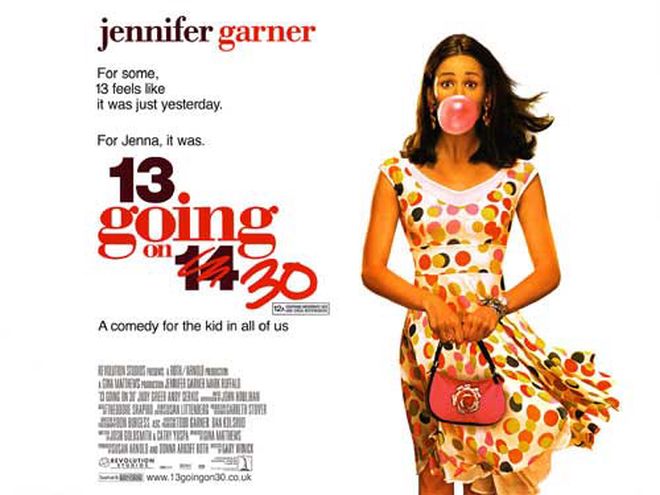
So last night I saw 13 Going on 30 on DVD, and while I enjoyed it, the movie left me in something of a funk. It took me a little while to figure out why. After all, the movie was funny, Jennifer Garner was really terrific – what a shock that this is her first big comedic leading role in a feature! – and the tone at the conclusion was uplifting. But I was just ticked off after the movie.
And then it hit me.
The really schmaltzy, supposedly romantic ending. That’s what did it. That’s what made the movie utterly depressing. Not because it was romantic, but, well…
[EDIT: Video clip was taken down.]
The movie goes fine, all the way through the sometimes very funny learning curve the now-30 year old “Jenna” has in catching up to her fabulously successful fashion magazine career, and continues on fairly solid light comedy footing all the way up through the point where Mark Ruffalo’s character, “Matt,” turns Jenna down and marries the other girl. They were childhood pals until the moment Jenna jumped from 13 to 30 years old. Apparently in the intervening years, Jenna had become a total bitch liar and backstabber, and Mark couldn’t forget.
“I’ve moved on,” he says. And for the movie, it’s a powerful moment.
It’s after this that the movie turns south. Jenna goes outside and in tears wishes herself back to 13 years old. She stays buddies with young Matt, and then 17 years later they get married and move into their pretty suburban house.
And I’m sorry, but that is just total bulloney. Or at least that’s the part that I found so depressing!
After all, in life there are no do-overs. Sure, it’s nice that Jenna gets to do over her life, but the real empowering ending would have been to see her move on, and rebuild her life despite the mistakes made in the past.
As it is, the movie gives the lesson that (a) a woman cannot succeed in a career without being a conniving witch, (b) if a nice girl slips through, she’s backstabbed by some other conniving witch of a career woman, and (c) the only happy path for a woman is to never have gone into a career and instead stayed the sweet girl and married the childhood sweetheart.
The Devil Wears Prada smacks of a similar kind of message, though the movie (unlike the book) has the good grace to end on a little ambiguity as to whether our heroine really does choose her jealous, possessive, judgmental, spiteful loser boyfriend and other so-called friends over the career she’s dreamed for. (Prada deserves a post of its own. Hopefully I can someday.)
What about the woman who wakes up to the awful life she’s living, and remakes her life without ditching the career, without running to the boy, without flashing back to June Cleaver’s kitchen?